For Berkeley Scientist Polina Lishko, a Time of Sadness and Anger for Ukraine
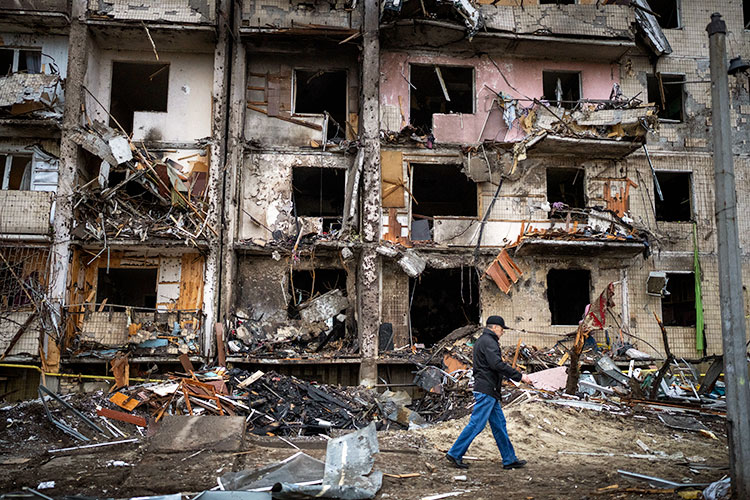
As Russian missiles exploded throughout Ukraine and Russian troops advanced toward the capital city of Kyiv this week, Polina Lishko was in her UC Berkeley office thinking about her family, and about the history of their Ukrainian homeland.
Her grandfather was a photojournalist during World War II, and she pulled out an old photo of his from 1941 that captured a Nazi bomb exploding in Kyiv. Now history seems to have come full circle, said Lishko, a physiologist and past winner of the MacArthur “genius” award. More than 75 years after Adolph Hitler provoked a global war that left millions dead, Russian President Vladimir Putin is offering a brutal new lesson in ambition and destruction.
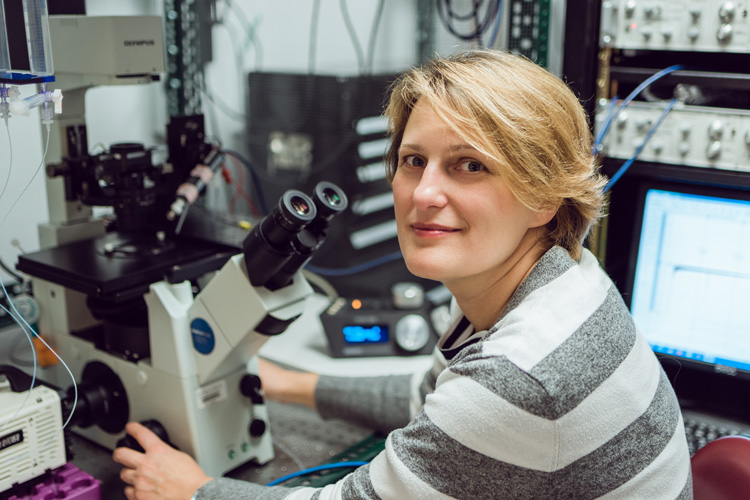
“I am feeling sad, and I’m feeling angry,” she said in an interview yesterday. “Anger at the stupidity of people who dream of rebuilding empires — empires that do not last, and that bring pain and devastation to the lives of their people.”
Lishko’s parents were chemists in Kyiv, and she grew up in this famously beautiful Ukrainian city. After receiving her Ph.D., she left Ukraine in 2000 and made stops at Harvard University and the University of California, San Francisco, before arriving at Berkeley in 2012. Her work is far from the realm of politics and power: Her research on how human tissues regulate steroid hormones has led to dramatic advances in understanding human reproductive systems, aging and Alzheimer’s disease.
Lishko, an associate professor of molecular and cell biology at Berkeley, has been a Pew Scholar and a Sloan Fellow, and in 2020 she won the MacArthur award. Earlier this month, she won Berkeley’s Bakar Prize.
Like others in a small but vital Ukrainian community on campus, Lishko expressed a defiant belief that her people would not be defeated. But, she said, sustained help from the U.S., Europe and other allies will be essential.
The interview has been edited for length and clarity.
Berkeley News: Less than 24 hours ago, Russian troops directed by President Vladimir Putin invaded Ukraine. What’s going through your mind today? What’s going through your heart?
Polina Lishko: It reminds me of what happened in the last century, the 1930s and ’40s. There’s a wannabe dictator, an emperor, who wants global power, or a couple of them, and they put in complete disregard the life and well-being of the rest of the world for their own ambitions.
We’ve been through this so many times with history, and still we are playing the same game: trying to appease the bully. That’s why I’m feeling pain — many people have been blessed for so many years with relatively peaceful lives that they let their guard down, and they don’t realize what they’re facing now.
And at the same time, I’m angry because people should know their history. They often think that appeasing the aggressor is the best way to find a peaceful solution. But they don’t realize that actually, by doing this, it just prolongs the inevitable.
Do you still have family and friends in Ukraine? What are you hearing from them?
Yes, mostly on my husband’s side — my in-laws, and my friends are there. Most of the family on my side is here (in the U.S.). But of course, we still have a lot of people there who are dear to us.
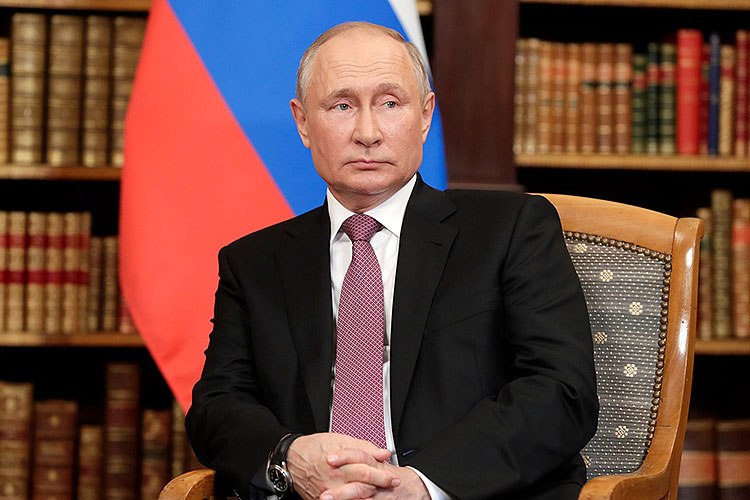
I am in constant contact with my friends and family members. They are strong, they do not panic. They also feel a mix of emotions: anger, somewhat disbelief, and the feeling of betrayal by their northern neighboring countries.
In the north-northeast, the Sumy region is under occupation. As of yesterday, nothing is working: Stores are closed, grocery stores closed, banks closed. People who were smart and stored extra food, they’re probably OK for now. Some people may not be so lucky.
I also have friends in Kyiv. Civilians there have been given weapons. Ukrainians are brave, they’re strong. They may be outnumbered, but they’re going to defend the country to the end. But it’s unfortunate that they’re not getting the much-needed military support and intervention from their neighbors.
Let’s back up for a moment. You were born in Kyiv, yes? What do you remember about the place where you grew up?
I lived in Kyiv until I was 26. So my whole childhood, my youth has many sweet and wonderful memories tied to my homeland. It’s one of the best places on Earth. People are amazing, they’re strong, they’re kind. They’re very peaceful. And they want to build a better future for their country, and for their neighbors.
It’s an amazingly green city. It’s also very fertile country — the agricultural production of Ukraine is well known. There’s a famous saying: You could put a stick in the ground and it will grow into a beautiful tree.
Do you recall the collapse of the Soviet Union? What effect did that have on daily life in Ukraine?
It was economic crisis. The change was sudden, and inflation was soaring. People lost most of their investments. Lots of people were shocked. Living in the Soviet Union for 70-plus years, many people had become infected with a Soviet virus in a way that they were not able to take care of themselves. We were relying a lot on social welfare systems, and we did not know how to be independent, how to start, build, and sustain your own business.
There were some pluses — free education, cheap medicine — but also minuses to living in the Soviet Union. It was a typical tyranny. You cannot express your mind. You cannot express yourself. You have to fit in a particular mold. And if you are out of this mold, you know you’ll be eliminated from the society, physically. So you have to be very careful what you say in front of people you don’t know well, even friends. People were living in constant fear.
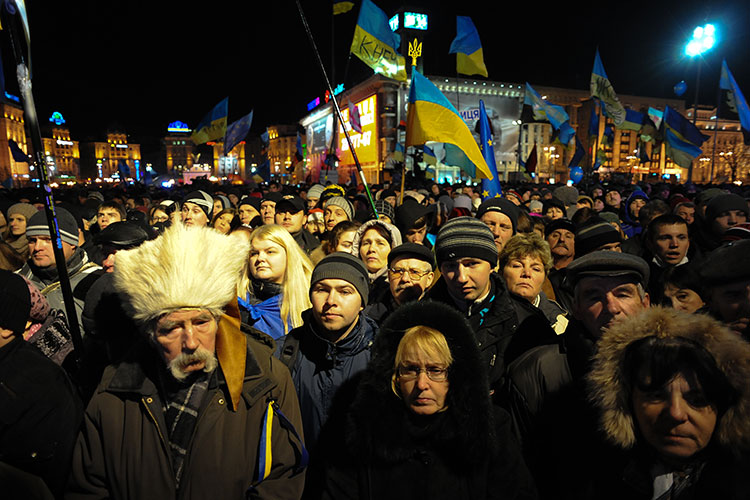
It’s my impression that after the initial challenges, Ukraine really seemed to bloom — especially after the Maidan revolution in 2014.
Yes, absolutely. There was economic uncertainty and an increase in corruption, in some ways, as the country was going through this transition. The ‘90s were hard, but it was like an economic rejuvenation. I left Ukraine in 2000. I remember coming back six years after and I was positively surprised how the country had changed for the better.
It was amazing — people were liberated, mentally. It was like somebody had removed a spell from them. Freedom makes people stronger. They find their true selves. They are building their own country, not based on some illusion of communism. They’re able to open businesses, and build houses, and feed their families.
Eight years after Maidan — why do you think this military action is happening now? What motivates Vladimir Putin?
Vladimir Putin is a global bully, and there are two ways to deal with a bully, just like with a school bully. You can appease them, and give them your lunch money, because you think if you do that they won’t hurt you. But most of the time you do that and they’ll still beat you up.
The other way to deal with bullies is to stand up to them and say: ‘No.’ Those, who stand up might be weaker individually, but if they unite their powers they become stronger, and maybe then the bully will back off.
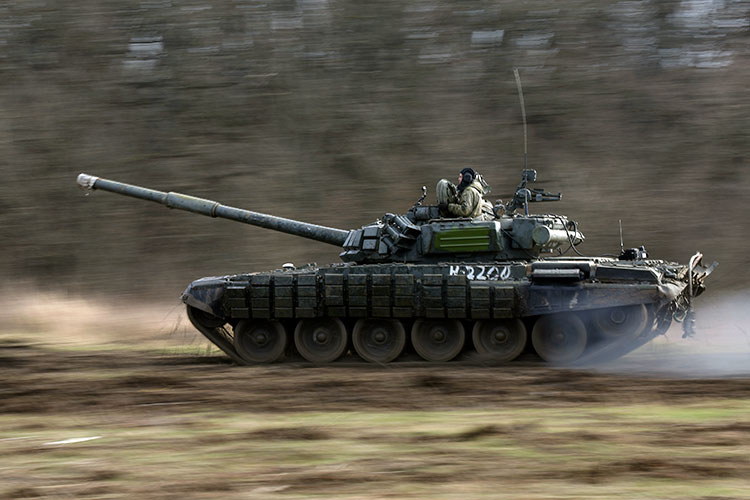
Vladimir Putin, like any bully, acts when he perceives weakness. It is not a coincidence that he attacked Ukraine now. The recent mistakes the United States made in withdrawing from Afghanistan made him stronger, made him bolder.
I am afraid Putin is not taking the U.S. and other global powers seriously anymore. And if this is true, he will not stop in Ukraine. The other countries must be ready. The only way to stop a bully is to unite powers. Otherwise, we will witness events like those that unfolded in Europe in the 1930s and 1940s.
I am not sure people understand this. It is a time to man up.
In your view, how is the current situation like Europe in the 1930s?
We know about Hitler and Germany, and we know how it all started. He took Austria, and then he took Poland, and then France, and the rest of the European countries. He tried to take the United Kingdom until Churchill stood up. It took some years for the United States to become actively engaged in opposition to Nazi Germany.
Putin wants global domination — that’s part of rebuilding the Soviet Union. He wants to build an empire which everyone in the world will fear. That’s what he wants.
Military analysts say that Russia’s military is much more powerful and well-equipped than Ukraine’s. What does that suggest about the future of this conflict?
Ukrainians are going to fight until the last. Many people will die, unfortunately, if it’s not stopped. I just hope there are enough sane people in Russia who understand how crazy this is.
There are amazing, brave people in Russia. It takes a special kind of courage to go out in the streets right now (to protest the war), knowing that they will be arrested and they will face persecution. I want to say that, as a Ukrainian, I’m not against Russian people. I have Russian relatives. My heritage is mixed.
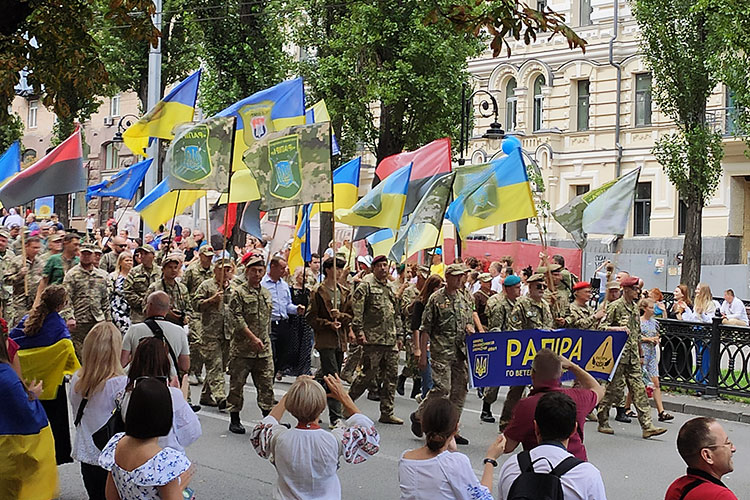
So what’s going to happen? Yes, Russia is a powerful, military-skilled country and they want to install a puppet government. That’s what Putin said. They want to denationalize life and demilitarize, quickly. They want to install the puppet government which reports to him, and they would still call it Ukraine — or not, I don’t know — but it would be Russia in every respect.
But you and others have suggested that even if Russia installs a puppet government, the conflict will go on.
Rebuilding a new Soviet Union will require the Baltic states, and Georgia, and other former Soviet republics. At this stage, I wouldn’t be surprised if the empire Putin wants to build is something ocean-to-ocean. So the entire continent of Europe, as crazy as it sounds, might be something he would like to see on his plate.
We already had one person in the last century who wanted this, right? So why would we say another potential global emperor is impossible?
The Western nations need to be prepared — they need to be seriously prepared for the next large war. Because if you’re not prepared for war, you will have it. And if you are prepared, you might be able to avoid it.
Do you have any closing thoughts?
I feel a little bit better being able to talk about this. I would say to folks all over the world: If you have a neighbor who’s Ukrainian, or there’s a Ukrainian person you know, just let them know you’re with them, provide moral support. It doesn’t require much, but it means a lot. We will go through this together, as human beings. And as long as we have our dignity, and as long as we are united, we will prevail.
